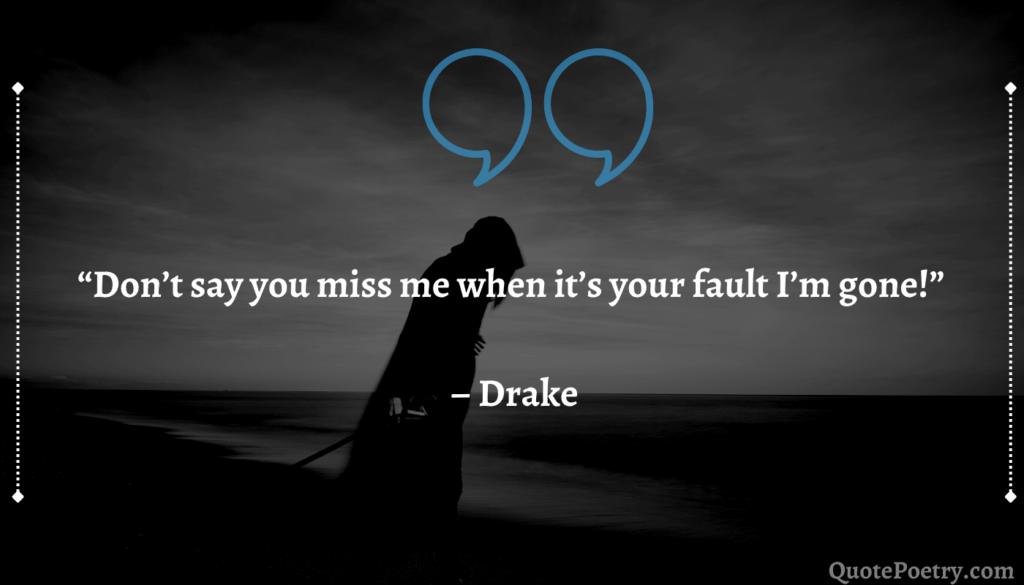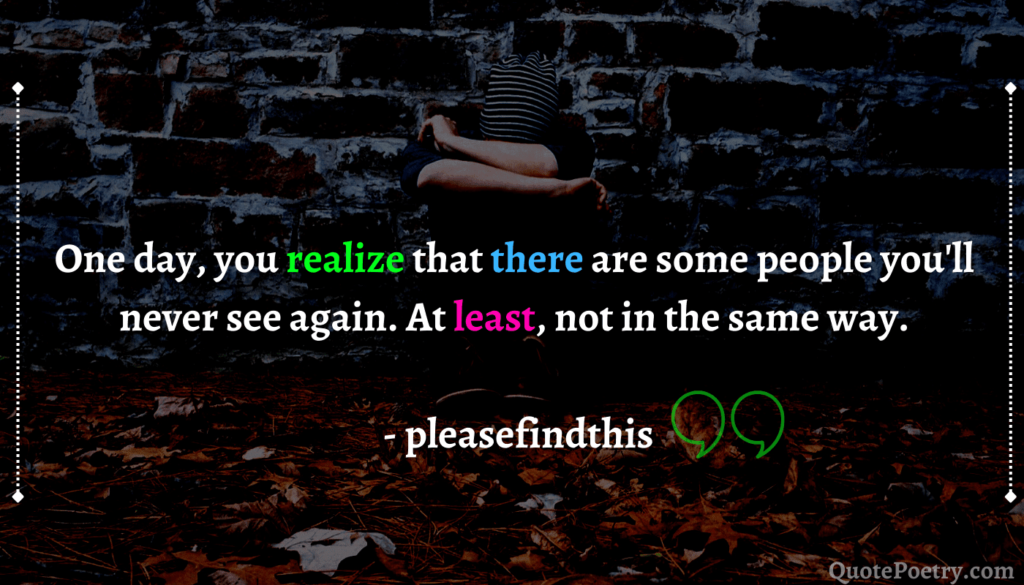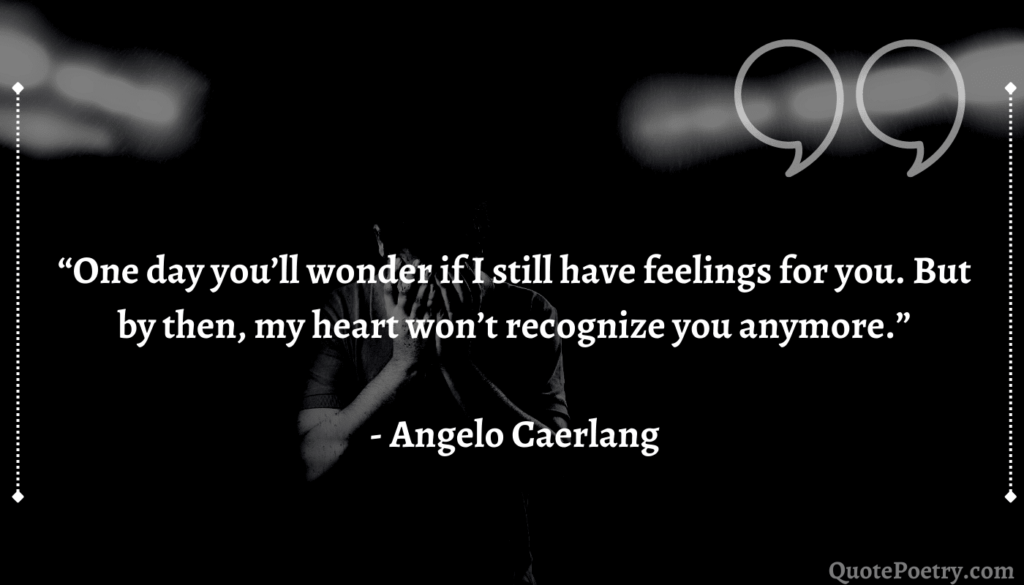The realization of someone’s absence often occurs after a period of time due to various reasons. Here are some common explanations:
- Familiarity and complacency: When people are accustomed to someone’s constant presence, they may take it for granted. Over time, they become complacent and fail to notice the absence until it becomes more apparent.
- Lack of awareness: People might be preoccupied with their own lives, responsibilities, or concerns, causing them to be less attentive to the absence of others. They may simply not realize that someone is no longer around until they actively reflect on it.
- Change in routine: When individuals go through changes in their daily routines, such as starting a new job, moving to a different city, or experiencing a significant life event, their attention may be focused elsewhere. These shifts can distract them from recognizing someone’s absence.
- Lack of communication: In today’s fast-paced world, communication has become more virtual and fragmented. People may not be in regular contact with each other, leading to a decreased awareness of someone’s absence. This can be especially true in the age of social media, where virtual connections may not always reflect real-life relationships.
- Selective perception: Sometimes, individuals selectively perceive the world around them, focusing only on what is immediately relevant to their current circumstances. This selective perception can prevent them from noticing someone’s absence until it becomes more pronounced or they encounter a situation where the person’s presence would have been expected.
How long does it take for someone to realize another person’s absence?
The duration it takes for someone to realize another person’s absence varies depending on multiple factors. Here are some key considerations:
- Degree of connection: The depth of the relationship between two individuals plays a significant role. In closer relationships, such as family members, close friends, or romantic partners, the absence may be recognized more quickly due to the strong emotional bond and frequent interaction.
- Frequency of interaction: The frequency with which individuals interact can impact how soon one notices another person’s absence. If they are used to regular contact or daily interaction, the absence may be realized sooner compared to infrequent or sporadic encounters.
- Awareness and observation: Some people naturally possess higher levels of awareness and observation, enabling them to notice changes in their surroundings more quickly. These individuals may realize someone’s absence sooner than others who are less observant.
- Impact of absence: If the absence of an individual has a significant impact on the daily lives or activities of others, it is more likely to be noticed promptly. For instance, if someone is relied upon for specific tasks or responsibilities, their absence may become evident sooner.
- External triggers: Certain events or triggers can bring someone’s absence to the forefront of people’s minds. Examples include social gatherings, shared experiences, or situations where the absent individual would typically be present. These external cues can expedite the realization process.
It’s important to note that the time frame for realizing someone’s absence can vary greatly depending on the circumstances and individuals involved.

What are the signs that someone is starting to realize your absence?
When someone begins to realize your absence, there are several signs and behaviors that may become apparent. These indicators can vary depending on the nature of the relationship and the individual’s personality, but some common signs include:
- Increased inquiries: The person may start asking others about your whereabouts or show curiosity about your activities. They might seek information about why you haven’t been present or inquire if everything is okay.
- Initiating contact: If someone starts reaching out to you more frequently or initiates contact that they didn’t before, it could be a sign that they are recognizing your absence. They may send messages, call you, or try to connect in other ways.
- Expressing concern: When someone begins to realize your absence, they may express concern about your well-being or inquire if something is wrong. They might show genuine care and interest in understanding the reasons behind your absence.
- Nostalgia or reminiscing: The person might exhibit signs of nostalgia by reminiscing about past experiences you shared together. They may bring up memories or express how much they miss spending time with you.
- Seeking proximity: If someone actively seeks opportunities to be in your presence or includes you in plans or activities, it could be a sign that they have realized your absence and now value your company more.
- Emotional responses: The person may exhibit emotions such as sadness, disappointment, or a sense of longing when discussing your absence or when reminded of situations where your presence would have been expected.
- Changed behavior: When someone recognizes your absence, they may adjust their behavior or routines to accommodate the change. They might make efforts to fill the void left by your absence or modify their plans to include you in the future.
These signs can indicate that someone is starting to realize and acknowledge your absence, suggesting that they are becoming more aware of your significance in their life.

Can absence make someone appreciate your presence?
Yes, absence can often lead to a greater appreciation of someone’s presence. When an individual is absent from another person’s life, it can create a void or a sense of loss. This void can spark a realization of the importance, value, and impact the absent person had on their life. Some reasons why absence can foster appreciation include:
- Contrast and perspective: Absence provides a contrasting experience to the presence of the individual. When someone is no longer around, their absence can serve as a reminder of the positive aspects they brought to the relationship. This contrast can enhance the appreciation for their presence.
- Reflection and evaluation: During the absence, people may reflect on the qualities, contributions, and positive experiences they shared with the absent person. This reflection can lead to a deeper understanding of the value they brought to their life, which in turn fosters appreciation.
- Loss and impact: When someone is absent, their impact on daily life and emotional well-being becomes more apparent. The void left by their absence can make others realize the positive influence they had, leading to a heightened appreciation for their presence.
- Growth and personal development: Absence can create personal growth opportunities for both parties involved. It allows individuals to develop new perspectives, gain independence, and appreciate the positive aspects of the relationship that they may have taken for granted in the past.
- Rekindling connection: Sometimes, absence can act as a catalyst for reigniting the connection between people. When someone realizes the impact of the absent person’s presence, they may actively seek to rebuild or strengthen the relationship, resulting in a greater appreciation of their presence.
However, it’s important to note that this appreciation may not always be universal or immediate. Different individuals may respond to absence differently based on their unique experiences, emotions, and the nature of the relationship.

What should I do if someone doesn’t realize my absence?
If someone doesn’t realize your absence, it can be disheartening and may leave you feeling unnoticed or unappreciated. Here are some suggestions on how to address this situation:
- Communicate your feelings: Express your thoughts and emotions to the person in a calm and non-confrontational manner. Let them know that you have been absent and explain how it made you feel. Open and honest communication can help create awareness and understanding.
- Provide context: Share the reasons behind your absence, if appropriate and comfortable for you. By providing context, the person may gain a better understanding of your situation and the impact it had on your availability.
- Reevaluate the relationship: Consider the nature of the relationship and whether the lack of realization of your absence is indicative of a larger issue. Assess if the person consistently fails to recognize your presence and if it aligns with your expectations for the relationship.
- Set boundaries: If the person continues to overlook your absence or fails to appreciate your presence, it might be necessary to establish clear boundaries. Communicate your needs and expectations regarding recognition and appreciation within the relationship.
- Focus on self-care: Instead of seeking validation solely from others, prioritize self-care and self-appreciation. Engage in activities that bring you joy, surround yourself with supportive individuals who value you, and cultivate a positive sense of self-worth.
Remember that relationships are complex, and people may have different ways of expressing their recognition or appreciation. It’s important to assess the overall dynamics of the relationship and determine what actions are most appropriate for your specific situation.

How does it feel when someone finally realizes your absence?
When someone finally realizes your absence after a period of unawareness, it can evoke a range of emotions. Here are some common feelings you may experience:
- Validation: The recognition of your absence can provide a sense of validation. It affirms that your presence was noticed and that you had an impact on the person’s life. This validation can be gratifying and reinforce your self-worth.
- Relief: If you’ve been feeling unnoticed or unappreciated, the acknowledgment of your absence can bring relief. It signifies that the person has become aware of the void you left and may indicate a potential for positive change in the relationship.
- Happiness: The realization of your absence can evoke happiness and joy, particularly if the person expresses genuine delight upon recognizing your value. It can strengthen your bond and bring about a renewed sense of connection.
- Mixed emotions: Depending on the circumstances, you might experience a mix of emotions. There may be a sense of satisfaction that the person finally realizes your absence, coupled with lingering disappointment or frustration from the period of unawareness.
- Empowerment: The awareness of your absence can empower you to prioritize your own needs and well-being. It serves as a reminder that your presence matters and may motivate you to establish healthier boundaries or seek relationships where your absence is valued.
It’s important to remember that everyone’s emotional response may differ, and your own reaction will depend on various factors such as the nature of the relationship and your personal expectations.

